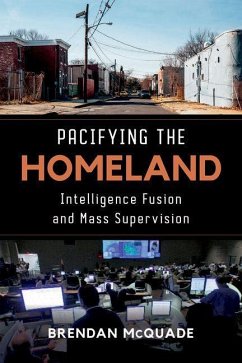The United States has poured over a billion dollars into a network of interagency intelligence centers called "fusion centers." These centers were ostensibly set up to prevent terrorism, but politicians, the press, and policy advocates have criticized them for failing on this account. So why do these security systems persist? Pacifying the Homeland travels inside the secret world of intelligence fusion, looks beyond the apparent failure of fusion centers, and reveals a broader shift away from mass incarceration and toward a more surveillance- and police-intensive system of social regulation. Provided with unprecedented access to domestic intelligence centers, Brendan McQuade uncovers how the institutionalization of intelligence fusion enables decarceration without fully addressing the underlying social problems at the root of mass incarceration. The result is a startling analysis that contributes to the debates on surveillance, mass incarceration, and policing and challenges readers to see surveillance, policing, mass incarceration, and the security state in an entirely new light.
Dieser Download kann aus rechtlichen Gründen nur mit Rechnungsadresse in A, D ausgeliefert werden.









